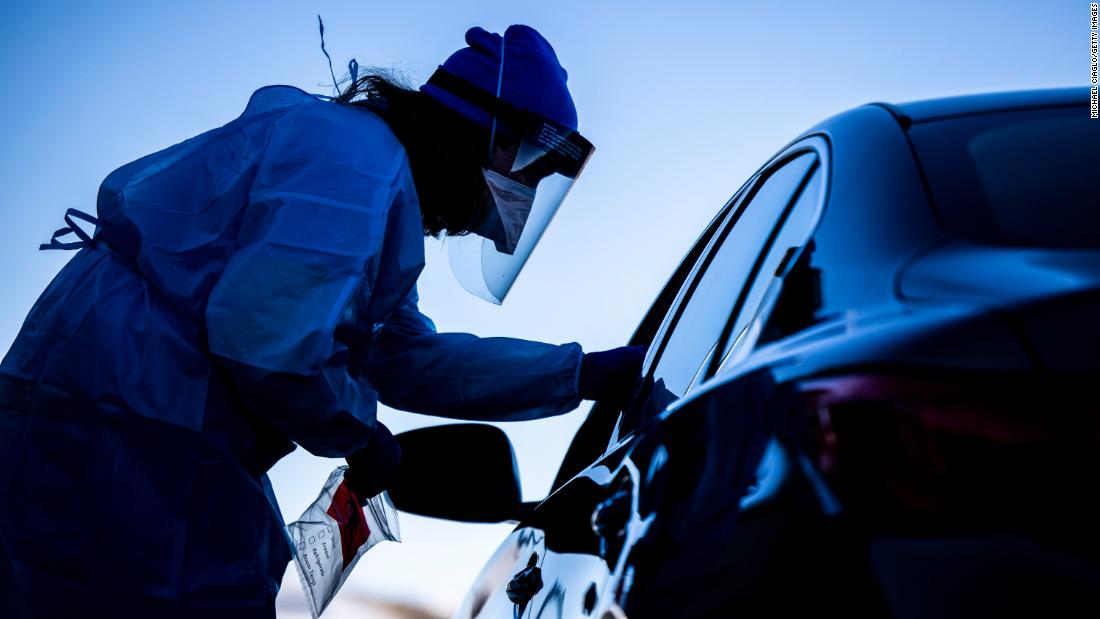Kentucky Governor Andy Beshear said the state was seeing a “real and significant increase in cases and in our rate of positivity at people gatherings around the holiday.”
“This sudden increase that we are in now is at least double the rate, the severity, of the previous peaks that we saw,” added the governor. “This is our most dangerous time.”
Colorado state epidemiologist Dr. Rachel Herlihy warned on Friday of the “first signs” of an increase in Covid-19 cases. “We are beginning to see the impact of holidays appearing in our data,” she said. Health experts believe that about one in 105 residents is contagious at the moment, added Herlihy.
“We continue to see a large percentage of Colorado’s population actively infected with Covid-19 and with the potential to transmit the infection to each other, so contact between individuals remains at high risk in this state,” said Herlihy.
It is a warning repeated in other states since the beginning of the new year.
The Arkansas governor said earlier this month that the state was “certainly up after Christmas.” And Mississippi officials said on Monday that the state had more Covid-19 patients in the ICU than ever before and was preparing for another increase in the number of viruses after the holiday.
“We strongly anticipate another increase after the holidays,” said state health officer Dr. Thomas Dobbs. “It is a recurring theme, it is not something that should be very surprising. And this is also happening when we have crowded ICU rooms, our hospitals are really overloaded ”.
“So I think this is an event that is likely to lead to significant dissemination,” he added.
It was a deadly week in the USA
“Public health reported more than 200 daily deaths this week,” officials said in a press release. “For comparison, the county averages approximately 170 deaths per day from all other causes combined, including heart disease, cancer, stroke, diabetes, car accidents, suicides and homicides.”
CDC eliminates ‘US variant’ reports
Meanwhile, more than 60 cases of the Covid-19 variant first identified in the UK have been identified in eight U.S. states, according to CDC data.
The CDC said that the number does not represent the total number of cases circulating in the country, but only those that were found through analysis of positive samples. Although the variant appears to spread more easily, there is no evidence that it is more deadly or causes more serious illness, the agency said.
Academic researchers also said they were intrigued by the reports, adding that there is no evidence that variant versions of the virus are driving its spread in the United States.
“I don’t know of any variant identified in the U.S. that could be responsible for the increase we’re seeing,” said Scott Hensley, a virus and immunity expert at the University of Pennsylvania.
“There are many reasons why infection rates have increased during autumn and winter,” he added. “The increase in cases does not necessarily need a genetic explanation.”
States call nontraditional vaccinators for help
Food and Drug Administration commissioner Dr. Stephen Hahn said on Friday that he was encouraging states to broaden the criteria for who can be vaccinated against Covid-19, as some states used only about 30 to 35% current vaccines they have, he added.
In other parts of the country, health systems are taking advantage of a number of newly trained students in nursing, medicine and dentistry to assist in this effort. And others are looking for retired health workers who have the skills to administer vaccines and are not actively serving Covid-19 patients.
Fauci: second dose of the ‘critical’ Covid-19 vaccine
Receiving the second dose of the Modern vaccine from Pfizer Covid-19 is essential for optimal protection, said Dr. Anthony Fauci on Friday.
“The second dose is absolutely critical,” he said. A dose of any of the vaccines, added Fauci, “has not proven to be effective to the degree we want and we don’t know how long the protection lasts.”
“Whatever you’re listening to, a dose of Moderna and a dose of Pfizer is not ideal,” he said. “The ideal is a dose of Pfizer, followed in 21 days by reinforcement. Or a dose of Moderna followed in 28 days with a reinforcement if you want optimal protection and ideal durability.”
Moderna claims to believe that the second dose of its vaccine can be administered effectively between 21 to 42 days after the first dose, a company spokesman told CNN.
When asked whether Moderna would be able to produce enough additional vaccine to obtain a second dose administered on the 28th, the company refused to respond directly.
CNN’s Gisela Crespo, John Bonifield, Lauren Mascarenhas, Naomi Thomas, Betsy Klein, Jim Acosta, Maggie Fox, Michael Nedelman and Melissa Alonso contributed to this report.
